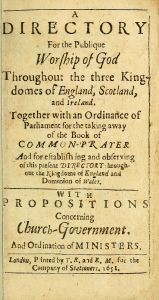 The Directory for the Publick [sic] Worship of God (circa 1644) is a very helpful (even if much neglected) part of the Westminster Standards. It gives us clear instructions on nearly every aspect of the public worship of God in the church, including such things as how the Scriptures are to be read (and by whom!), the right manner of corporate prayer both before and after the sermon, the proper way to administer the sacraments of baptism and the Lord’s Supper, as well as many other things.
The Directory for the Publick [sic] Worship of God (circa 1644) is a very helpful (even if much neglected) part of the Westminster Standards. It gives us clear instructions on nearly every aspect of the public worship of God in the church, including such things as how the Scriptures are to be read (and by whom!), the right manner of corporate prayer both before and after the sermon, the proper way to administer the sacraments of baptism and the Lord’s Supper, as well as many other things.
Not surprisingly, it also contains a brief section outlining the right manner of preaching the word of God. These directions are as helpful as they are simple, and it would no doubt be of great benefit to the church to get back to these basics of biblical preaching.
In the Directory the Westminster divines note that the preacher ought to have three (3) primary concerns in his preaching:
First, the preacher must ensure that the matter be the truth of God. In other words, is what the preacher says truly biblical? Not just the truth, but specifically the truth of God. That is to say that the matter of the sermon must be found in the Word of God. Many things might be true enough in and of themselves, but are not really the subject matter of Scripture. A sermon simply must be true and biblical.
If what is being said in the pulpit is not the truth of God, then it really isn’t a sermon (at least not a Christian one) at all. It may be truly rousing oratory; it may be a very informative lecture; it may even be a fine motivational speech; but it is not a sermon in any meaningful sense of the word.
Second, the preacher must see to it that the truth that he preaches is contained or grounded in the specific text of Scripture that he is preaching. Sometimes preachers preach the right doctrine (see #1 above), but do so from the wrong text. In other words, the matter of the sermon must actually be the matter of the text itself. If not, how will the hearers understand how the preacher arrived at the points or conclusions that he is seeking to impress upon them?
You could say that every time a minister preaches a sermon (if he is doing so according to what the Westminster divines say here), he is not just teaching the flock what the Word of God says, but is also implicitly teaching them how to study the Word of God for themselves! What a blessing and added benefit that would be for any church!
Third, the preacher must primarily emphasize what the text itself primarily emphasizes. In other words, the preacher’s main point(s) ought to be so derived from the main point(s) of the Scripture text, that they are one and the same. And in this way the hearers are to be best edified. The central message of the sermon should be the central message of the text of Scripture. If not, can it really be said that the text itself was properly preached?
May the Lord Jesus Christ, the Head of His church, grant that His ministers would preach His Word faithfully. And may they preach according to these simple rules found in the Directory – that their preaching might be biblical, that it might be based upon the text of Scripture itself, and that it might emphasize what the text itself emphasizes.